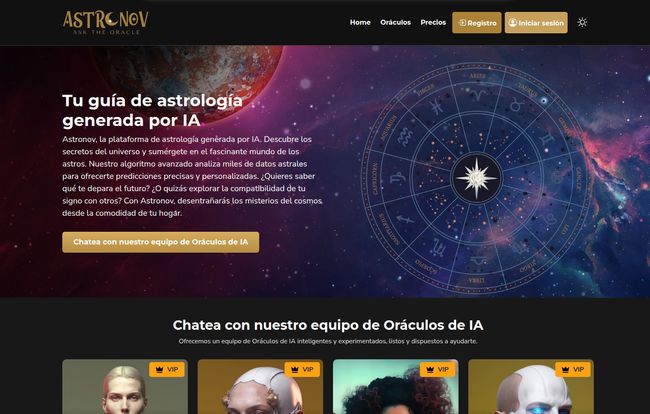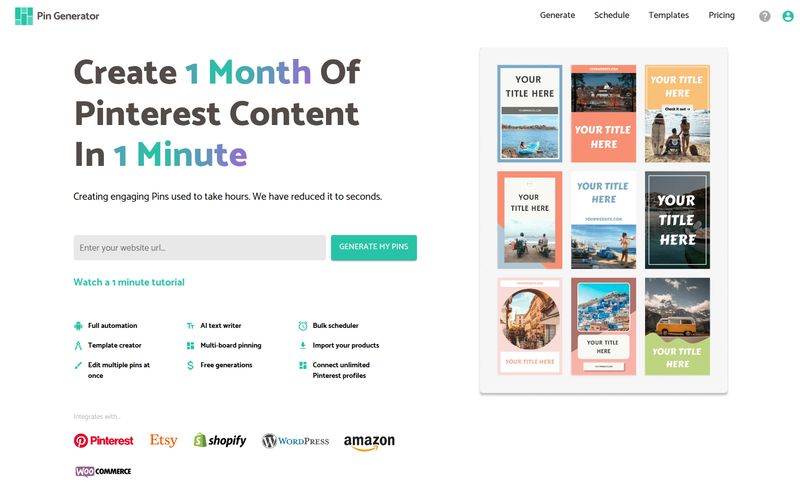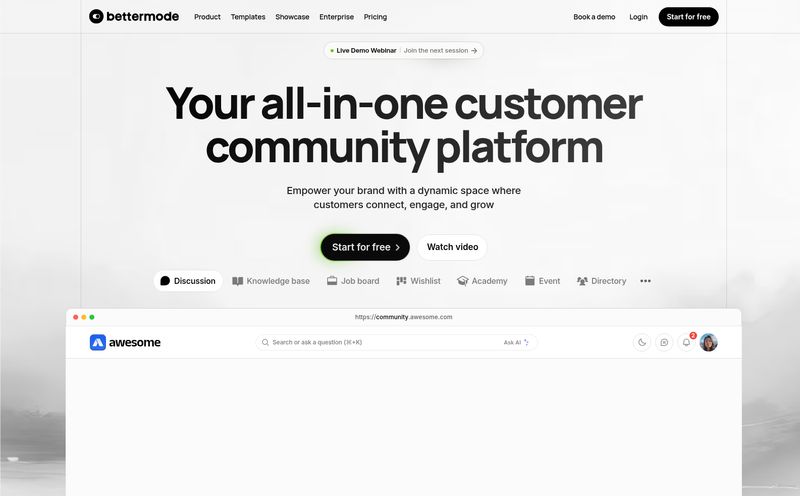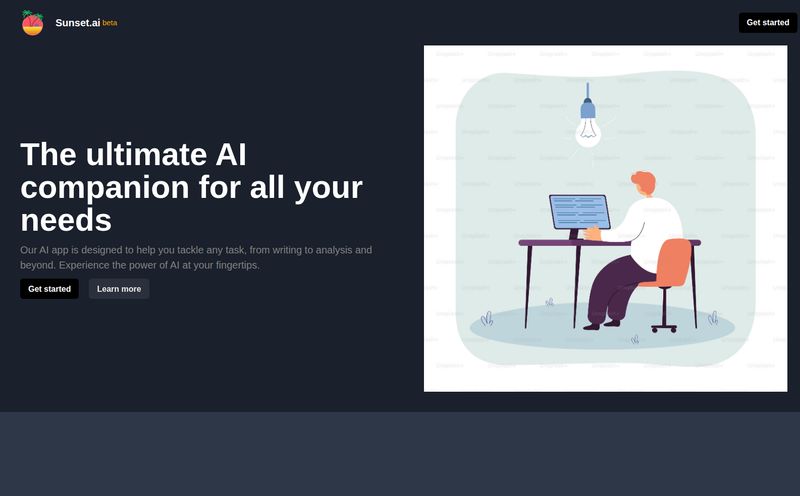I’ve spent years neck-deep in SEO, traffic analytics, and the ever-shifting sands of digital trends. It’s my job. But outside of work, I’ve always had a soft spot for the… let’s call it, less quantifiable side of life. I’m talking about astrology. Yeah, I’m that person who asks for your birth time at a party. So you can imagine my curiosity when I stumbled across a platform that promised to smash these two worlds together: Astronov.
The tagline on its moody, space-themed homepage was in Spanish:
Tu guía de astrología generada por IA.My AI-generated astrology guide. It felt like something straight out of a William Gibson novel. A platform that uses advanced algorithms to chart your destiny? Sign me up. I had to see what this was all about. What I found was a fascinating, ambitious, and ultimately cautionary tale about the intersection of ancient mysticism and modern tech.
So, What Was Astronov Anyway?
At its core, Astronov was an AI-powered platform designed to make astrology accessible. Forget booking a session with an astrologer weeks in advance. The idea here was instant cosmic gratification. The platform claimed to analyze tons of astral data to give you personalized predictions, check your compatibility with your partner, and generally unravel the mysteries of your life path, all from your couch.
It wasn't just a generic horoscope generator spitting out the same vague advice for every Leo. The promise was true personalization, using the power of artificial intelligence to interpret the specific nuances of your own chart. A pretty bold claim, and one that the entire digital wellness industry is chasing right now.
The AI Oracles: Your Personal Cyber-Mystic Council
Okay, this was the part that really grabbed me. Astronov didn’t just have one faceless AI. It had a whole team of them. They called them the AI Oracles, and each had a unique, almost cyberpunk-ish avatar and a specialisation. It was like assembling a team for a heist, but instead of cracking a vault, you're cracking your subconscious.
You could chat with:
- Oráculo 1 (Dreams): To figure out why you keep dreaming about your teeth falling out.
- Oráculo 2 (Zodiac): For your classic zodiac deep dive.
- Oráculo 3 (Tarot): An AI tarot reader. Wild.
- Oráculo 4 (Numerology): For those who believe in the power of numbers.
- Oráculo 8 (Love): To analyze your romantic compatibility.
And others, specializing in things like Bach Flowers and Vocational Maps. Some of these oracles were labeled “VIP,” which, as we’ll see, tied directly into their business model. The concept was brilliant, turning a simple AI chatbot into a pantheon of digital soothsayers. It gave the platform a personality that most tech companies would kill for.

Visit Astronov
Breaking Down the Cosmic Credits
Naturally, this digital guidance wasn't all free. Astronov ran on a credit-based system, which is a common strategy for platforms offering micro-transactions. You'd buy a pack of credits, and then presumably, spend them to chat with the oracles. It seemed pretty straightforward. The more you paid, the more credits you got, and the more access you had to the VIP oracles.
Here's a quick look at their pricing plans:
| Plan Name | Price | Credits |
|---|---|---|
| Básico (Basic) | €5 | 50,000 |
| Premium | €10 | 100,000 |
| Bronce (Bronze) | €15 | 150,000 |
| Plata (Silver) | €20 | 200,000 |
| Oro (Gold) | €25 | 300,000 |
| Platino (Platinum) | €30 | 400,000 |
One thing that gave me pause was the lack of clarity on the burn rate. How many credits did a 10-minute chat with the Tarot Oracle cost? 5,000? 20,000? This kind of ambiguity can be frustrating. You want to know what you’re getting into before you start pouring out your soul to a bot. And let's be honest no one likes a vague credit system.
The Celestial Highs and the Black Holes
So, what was the verdict? Well, like any good astrological chart, Astronov had its favorable aspects and its challenging ones.
The Good Stuff
The accessibility was a huge plus. The idea of getting instant, personalized astrological insights without judgment is powerful. The user interface was slick, and the concept of specialized oracles was, frankly, genius. It was a one-stop-shop for the modern mystic, blending different divination arts under one digital roof.
The Not-So-Good Stuff
The first hurdle is the one many traditionalists will point to: can an AI really do this? Astrology is often seen as an intuitive art, a synthesis of complex symbols that requires a human touch. Can an algorithm replicate that spark of insight? I'm skeptical. It can process data, for sure, but can it offer wisdom?
And then there’s the biggest issue of all. The one that turns this from a review into a bit of a post-mortem. The domain has expired. Poof. Gone. Astronov performed a cosmic disappearing act, falling into the black hole of forgotten websites. It’s a stark reminder of the volatility of the digital world. You can have the coolest concept, but if the business isn't sustainable, it can vanish overnight.
AI vs. The Human Astrologer: The Great Debate
Astronov’s existence (and disappearance) sits right in the middle of a hot debate. Can AI replace human experts in fields like this?
On one hand, AI can process mind-boggling amounts of data. It can calculate every planetary aspect, transit, and progression in your chart in a split second—a task that would take a human astrologer considerable time. This is where tools like Astronov could shine, doing the heavy lifting and spitting out raw data or basic interpretations.
However, a good astrologer does more than calculate. They synthesize. They listen. They use intuition to weave a narrative from the symbols. They understand the human context behind the chart. An AI might tell you that Saturn is squaring your Venus, which can mean relationship challenges. A human astrologer can talk you through what that feels like and help you find constructive ways to navigate it. I personally think AI is an incredible assistant, but a poor master. It's a tool, not the artist.
Even though Astronov might be cosmic dust now, its spirit lives on. The trend it tapped into is only getting bigger. Apps like Co-Star and The Pattern have exploded in popularity, blending psychological language with astrological data to create an experience that feels deeply personal. They've proven there's a massive appetite for this stuff.
Frequently Asked Questions
- What was Astronov?
- Astronov was an online platform that used artificial intelligence (AI) to provide personalized astrology readings, including birth chart analysis, compatibility reports, and chats with specialized "AI Oracles" for things like tarot and numerology.
- How did the AI Oracles work?
- The AI Oracles were essentially specialized chatbots. Users could choose an oracle based on their area of interest (e.g., love, dreams, zodiac) and engage in a text-based conversation to receive AI-generated guidance and insights.
- Is Astronov still available?
- No. As of my latest check, the Astronov website domain has expired, and the platform is no longer accessible. It serves as an example of an interesting but now-defunct digital service.
- Was Astronov free to use?
- It operated on a freemium and credit-based model. While there was likely some free access, deeper engagement and chats with “VIP” oracles required purchasing credit packs, with prices ranging from €5 to €30.
- Can AI really be accurate for astrology?
- This is a topic of debate. AI is excellent at calculating complex planetary positions and aspects quickly. However, many people believe the intuitive synthesis and interpretation of these elements require a human touch that AI cannot yet replicate.
- Are there any good alternatives to Astronov?
- Yes, the digital astrology space is growing. Popular apps like Co-Star and The Pattern offer detailed, personalized astrological and personality insights, though they have a different user experience than Astronov's chat-based oracle system.
Final Thoughts from a Fellow Star-Gazer
Astronov was a brilliant, fleeting experiment. A shooting star in the digital cosmos. It aimed high, trying to merge the ancient art of divination with the bleeding edge of technology. While it may not have lasted, the idea it championed is here to stay.
We're going to see more and more platforms trying to decode our human experience with algorithms. And maybe that's not such a bad thing. Whether you're consulting the stars, a deck of cards, or a surprisingly insightful AI, the real goal is always the same: to understand ourselves a little bit better. The tools may change, but the quest is eternal.
Reference and Sources
- Co-Star Astrology: https://costarastrology.com/
- The Pattern: https://www.thepattern.com/
- Note: The original Astronov website is no longer active. The analysis is based on archived content and images of the platform when it was live.



